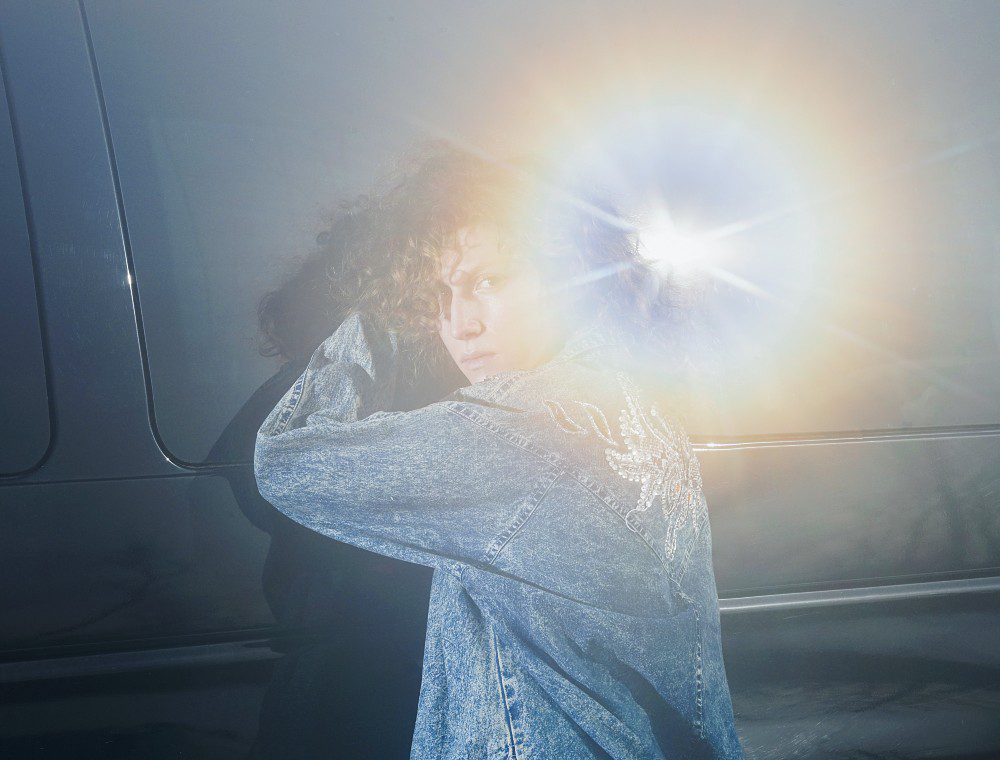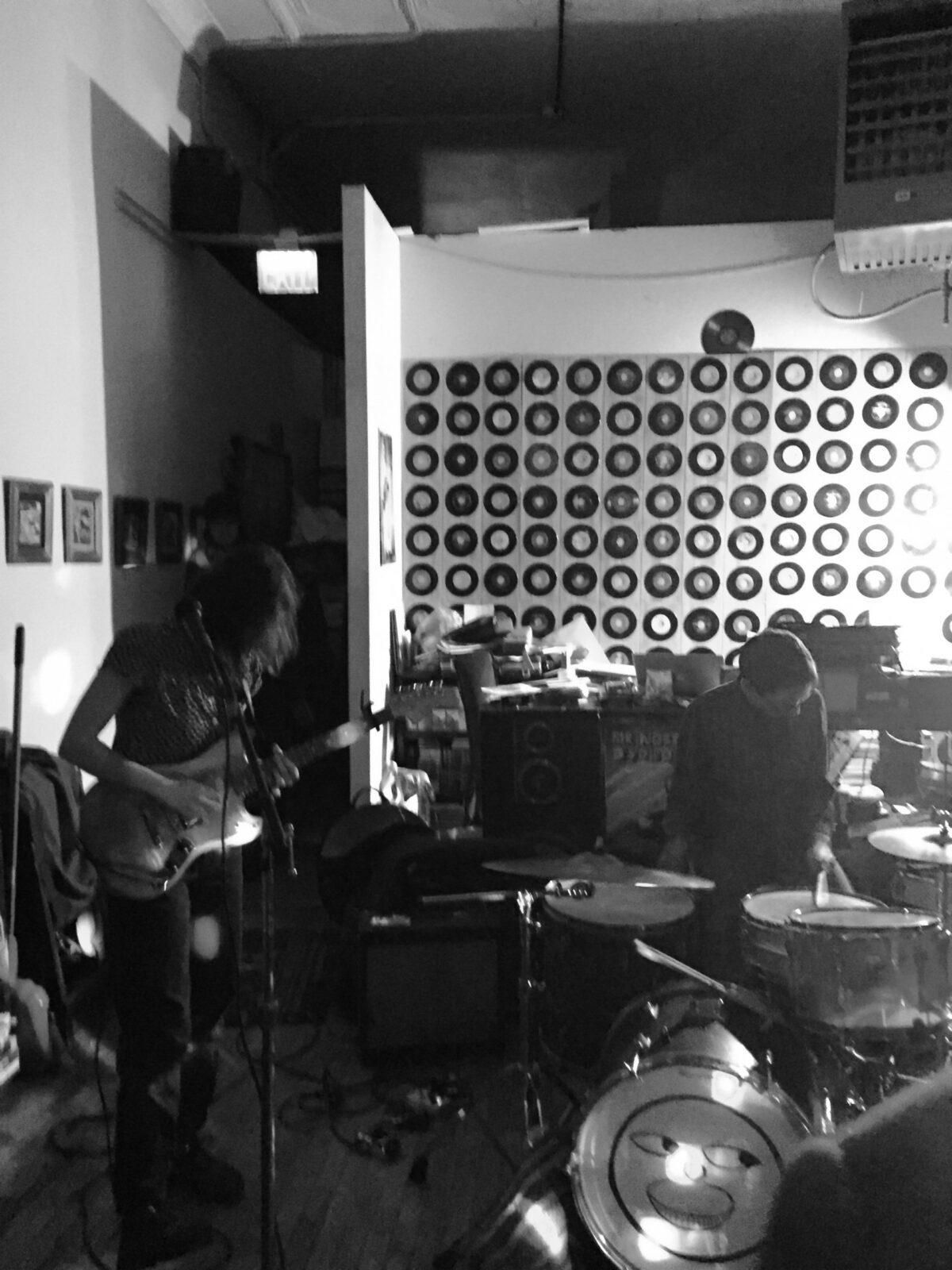

“I feel like I’m like a hedonist,” says Ella Williams, the mastermind behind whimsically-named alt-pop project Squirrel Flower. “I just allow my impulses and my desires to affect the actions I take.”
She’s discussing the beating heart track of her newest album, Planet (i), out June 25th on Polyvinyl. “Flames and Flat Tires” is one of the record’s most untethered tracks, with a sense of looseness and levity that contrasts with some of the album’s darker moments. And while the character in “Flames” isn’t explicitly Williams, she isn’t denying that sometimes she feels like she, too, is hurtling through life with her foot on the gas.
“[‘Flames’] is partially inspired by this novella by an author named Torrey Peters,” she explains. “It’s called Infect Your Friends and Loved Ones. It’s like a queer, trans apocalypse story, and it takes place in Iowa, and the first couple scenes are this person on I-80 Iowa in this fucked-up car that they’re trying to like, fix themselves.”
Planet seems to be quite taken with the things we can’t fix ourselves — natural disasters, busted cars, narcissistic people — but it’s not meant to be fatalistic. “[Planet is] not an apocalypse album because ‘apocalypse’ implies one event that changes the earth and makes it uninhabitable,” Williams says. “I think it’s just that we’re kind of living in an ongoing apocalypse, and in that are both moments of incredible utopia and moments of actual full-on disaster. And I think acknowledging both of those as things that happen at the same time is a huge point of the album.”
While disaster has certainly been the flavor of the past year and a half, Williams has been immersing herself as much as she can with the music scene in Chicago, where she recently moved. “I’ve been going to a lot of techno raves,” she says with palpable excitement. “It’s [these] incredible moments of utopia that I was talking about — just like very queer spaces and beautiful community spaces and dancing and techno, and it’s so sick.”
Williams moved to Chicago in part to be closer to her bandmates, but the opportunity to get to know a delicious new scene was undeniable. “I first went to a DIY show in Boston when I was sixteen,” she recalls. “From there it just like took over my life and changed my life and changed the way that I thought about music and [how I] thought music could work.” Williams emphatically credits the Boston music scene as instrumental to her journey as an artist — as well as the scene in Iowa and her experience recording Planet in London.
While the constant moving and adjusting can be difficult, Williams feels she has some precedent for living her life the way she does, mainly inspired by her grandfather, Jay Williams, who was a writer, Vaudeville performer, and “card-carrying Commie,” and his wife Bobby, a community organizer. “Every time I’m like, ‘damn — it would be nice to have like a little more money or a little more stability and not be living in like five different places every year’… I think about the way my ancestors have lived, which is very transient and allowing art and music and love and connections and relationships to guide them through life, as opposed to anything else,” Williams says.
While the overarching lyrical themes on Planet certainly reflect this transiency, there are a few small moments that approach it from a different angle — lead single “Hurt a Fly” and “Deluge in the South” both detail the experience of searching for refuge in other people, specifically in their homes. “But then I showed up at your door/With my head in my hands/And you took me in,” laments the narcissistic partner Williams channeled in the former, while she promises “I will take you in/Wrap you up again,” in the latter. While the two songs are not specifically connected, the concept of constructing home where you can, with what and who you can, is classic apocalypse.
But like Williams said, this is no apocalypse album. If anything, it’s simply observational. As a function of her DIY ethos, Williams has been rather boots to the ground since 2015, when she self-released her first EP, Early Winter Songs from Middle America. But even after her much-praised label debut (2020’s I Was Born Swimming, on Polyvinyl) Williams wasn’t allowed much distraction, instead finding herself stuck in quarantine with little to do but process everything she had experienced on her last self-booked tour. “I got home and had just like seen all of this really insane shit. I saw the desert in California for the first time and I was driving through Missouri and there was so much flooding that it looked like we were like driving through this field of glass, and there were billboards and trains going through and coming out of the water, and it was so nuts. Just like, insane storms after shows.”
Williams is very preoccupied with weather and the power of water on Planet. It gets mentioned on almost every single track, most notably on “Desert Wildflowers.” “I’m another piece of debris/Flying above the town/Closer to the stars than I am to the ground,” she coos before the song’s central manifesto: “I’m not scared of the water/The rain is my parent and I am the daughter.”
“Desert” was the first song she wrote for the record. That songwriting session must have been some kind of unconscious preparation for things to come, as the song feels like an affirmation in the form of a lilting lullaby, like some part of Williams knew it was time to face the particular fears — or strengths, depending on how you look at them — that drape Planet like tapestries.
“I got home and the song just came out,” she says. “And I kind of just rolled with it.” She wrote so much, in fact, that there is a whole other Planet album that exists somewhere in the stratosphere, or in some hidden folder on Williams’s computer. Call it Planet (ii), or call it the ghost album — either way, Williams doesn’t have any plans to release those songs any time soon. But it does haunt her in some ways, as ghosts tend to do. “Is the music only what’s shared with other people?” Williams asks. “Or is the music what you make and experience with yourself and your process?” Williams has plenty of time to keep looking for the answer, no matter where it takes her in her busted-up car.
Follow Squirrel Flower on Facebook and Instagram for ongoing updates.




